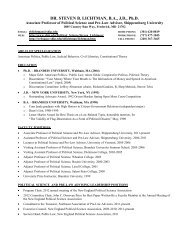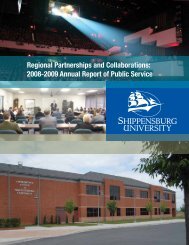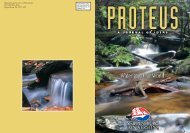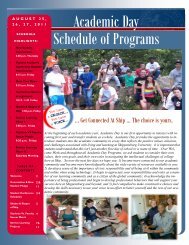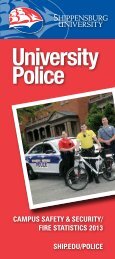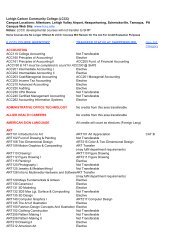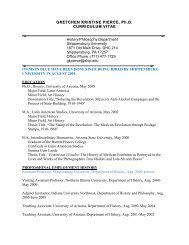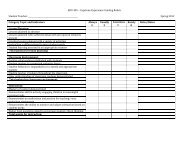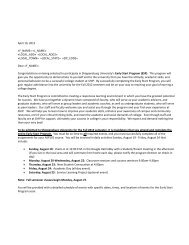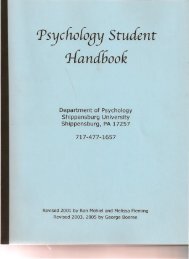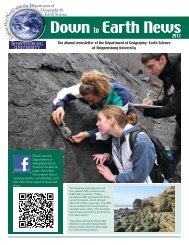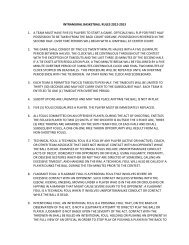Graduate Catalog - Shippensburg University
Graduate Catalog - Shippensburg University
Graduate Catalog - Shippensburg University
You also want an ePaper? Increase the reach of your titles
YUMPU automatically turns print PDFs into web optimized ePapers that Google loves.
Courses of InstructionELP508 <strong>Graduate</strong> Seminar in Instructional Strategies (3 crs.)Comprehensive study and systematic examination of classroominstructional strategies. Designed to involve teachers in the process ofanalyzing and improving the effectiveness of their methods. Teachersdevelop and cultivate alternative instructional strategies on the basisof their analyses through the utilization of various instruments andprograms, complemented by the process of microteaching.ELP510 Special Education Law (3 crs.)Provides a comprehensive and current overview of the major federallaws and judicial interpretations of those laws that apply to the educationof children with disabilities. Includes discussions of inclusion,effective accommodations, IEPs, discipline, equal protection, andprocedural due process. Examines the six principles of the Individualswith Disabilities Act and Chapters 14, 15, and 16 of the PennsylvaniaSchool Code. Helps students understand what the law requires sothey will become effective educational leaders capable of making appropriatedecisions that comply with these laws.ELP511 Philosophical Foundations of Education (3 crs.)Survey of major European and American philosophies which haveinfluenced education and outstanding philosophy schools which haveaffected education in relationship to changing patterns of Americanschools with respect to procedures and curricular materials.ELP512 The Curriculum in the Modern Secondary School (3 crs.)Deals with the changing curriculum of the American secondaryschool. Topics include the history and status of new curriculum projectswith the controversy, problems, and issues involved.ELP513 Sociological Foundations of Education (3 crs.)Attempts an analysis and understanding of social factors in the socializationof the individual and the process of education. Begins withthe context of culture and studies the structure and functioning of thesocial system in those areas which particularly seem to impinge uponthe specialization process and which particularly affect the schooland the child. Considers the institutions which are of fundamentalimportance in socialization and education. Makes use of significantsociological data and principles which are applicable to educationalpractice and are indicative of what educational policies and practicesmight be.ELP514 Practicum I Leadership Field Experiences at the BuildingLevel (3 crs.)Provides an initial exploration and exposure to leadership roles at thebuilding setting within the school environment and should be takenas part of candidate’s Tier 1 cluster of courses at beginning of programof study. Candidates expected to log 180 hours of practical fieldexperiences to include, but not limited to, shadowing school leaders,observing other educators, assuming responsibility for basic leadershipactivities as assigned by mentor, and conducting a case study onleadership concepts. In addition, candidate will participate in threeleadership seminars which focus on leadership foundations and bestpractices as articulated by current leaders in field and a basic actionresearch activity. Candidates begin to explore role of the principal/supervisor as an agent of change and/or reform.ELP515 The Role of Research and Data Informed Decision-Making forSchool Leaders (3 crs.)Designed to provide school administrators with the knowledgeand skills necessary to be intelligent consumers and practitioners ofresearch. Research designs, methods, and results are important toolsfor leadership and decision-making: administrators should be ableto evaluate research studies and implement the findings. Requirementsof federal legislation necessitates leadership that is, in part,derived from data-based decision making. Additionally, there maybe situations in which an administrator is responsible for constructinga research proposal to qualify for a grant or to lead change in aneducational program.ELP516 Curriculum Assessment and Instructional PK-12 for DiverseStudent Populations (3 crs.)Focuses on curriculum development, implementation, and assessment(through instructional practice in U.S. public schools. Designed forboth future school leaders and central office administrators, studentswill study curriculum from the foundation of three bases: (1) socialforces, (2) theories of human development, and (3) the nature oflearning and learning styles. Bases will assist students in definingcurriculum by helping them understand key issues from both anhistorical perspective and current thinking. Useful for individualsaspiring to be (or already serving as) principals, supervisors, counselingpersonnel, subject area specialists, and superintendents. Emphasisplaced on approaches to developing, evaluating, and articulating curricularchanges drawn from a wide variety of subject areas. As a resultstudents will be knowledgeable of the fundamentals of curriculum;the connection between curriculum, instruction, and assessment;current curricular issues; innovative approaches to curricula; planningcurricular strategies; and analyzing current curricula.ELP517 Leadership in Technology and Effective Program Delivery(3 crs.)Designed to provide future school administrators with the requisiteskill sets and conceptual knowledge needed for effective 21st centuryleadership. Understanding technology as a tool for learning, managing,analyzing, communicating, and collaborating is integral tosuccessful school leadership at the classroom, building, and centraloffice levels. Topics explored include technology integration, digitalcitizenship, use of technology in systemic organizational improvement,professional growth, digital culture, and visionary leadership. Inaddition to developing personal philosophies regarding use of technologyin teaching, learning, and leading, each student will develop apersonal portfolio of resources.ELP518 The Role of Supervision in Promoting Student Achievement(3 crs.)Designed for educational leaders, whether they are practicingadministrators, subject-area supervisors, department chairpersons,cooperating teachers, or mentors. Principal thrust is to facilitate theformulation and implementation of a teacher evaluation and supervisionsystem--based on data-driven and researched-based strategiesand practical skills, and supported by law--that promotes enhancedstudent learning and quality teaching. Treats supervision and evaluationas two separate but complementary functions that should beintegrated into a coherent system that provides differentiated opportunitiesfor teacher growth and evidence-based quality assurance.Assists in developing the research-base, practical skills, and necessarydispositions to meet the needs of all teachers, regardless of theircurrent career stage or level of performance. Many class meetings arework sessions that focus on learning and refining the skills necessaryto evaluate the instructional act and to support the professionalgrowth of teachers and will include individual and group activities ina supportive environment where participants actively engage in andreflect upon their conceptual understanding and skill developmentrelative to evaluation and supervision.ELP519 Advanced Leadership and the School Principal PK-12 (3 crs.)Introduces future educational leaders to school level administration.Focusing on the multi-faceted roles of a school leader, students willstudy the principal through the lens of the principal as a learner,mentor, instructional leader, supervisor, manager, politician, advocate,and innovator. Combining theory with practice, students will obtain adeeper understanding of the complexity of leadership at the buildinglevel.87



